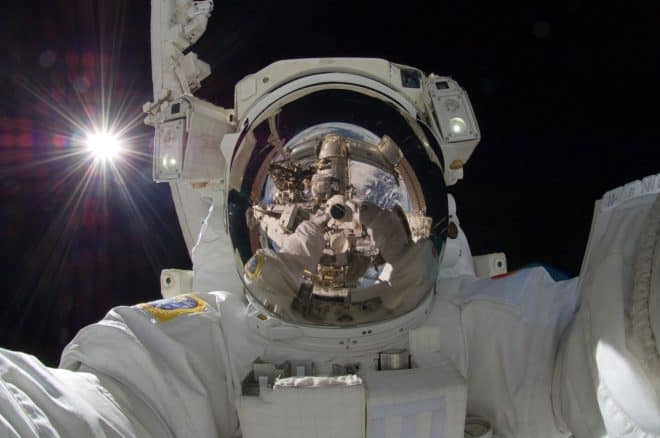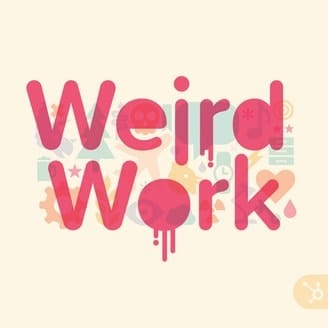Podcast Spotlight: Weird Work


Weird Work chronicles the odd jobs people earn a living from. And we’re not talking about your typical side hustles or maybe off-the-beaten-path jobs either, Weird Work has detailed a dinosaur and monster erotica writer, a scent maker, Hollywood’s bug wrangler, and even a mermaid.
I had a chance to email Sam Balter about the unique circumstances that led to creating a podcast within a corporation, the origin of Weird Work, and the different set of challenges they face. Below is our Q&A.
Listen: Apple Podcasts | Stitcher
Discover Pods: Weird Work, highlighting people with odd occupations, is a pretty unique idea. Where did it come from?
Sam: Our company’s first show, The Growth Show, focuses on helping people grow their business. And we talk with thought leaders from all sorts of different industries to get a sense of how they grew their own companies. We know anyone can learn a good deal from these episodes, but a large chunk of our audience belongs to the executive level business worker.
So with Weird Work, we wanted to reach a different part of the business podcast audience. We wanted to create a show for people who are about make that fateful leap into the working world for the first time or those who after decades of working in one job are looking to make a career change. And while we tend to think of work in the traditional 9 to 5 sense, the working world is so much more diverse and interesting.
We wanted to talk with individuals who pursued their own passions, no matter how weird they might sound. And for me, there’s nothing more interesting than talking with real people who’ve become masters of their own domain. Especially if that domain involves mermaids, human ashes, ASMR, or microdosing LSD.
DP: How does Hubspot view podcasts as a content marketing channel?
Sam: Podcasts are about telling stories. They’re accessible to a large portion of the population. And despite being around for years, podcasts are still an emerging channel. That presents a huge opportunity for growth — be it in monetization, brand awareness, or plenty of other valuable areas.
We don’t approach podcasts in a traditional business sense. We don’t monetize the show with ad revenue, for instance. At HubSpot, we see podcasts as a way to connect with audiences and help share stories from influencers and interesting folks alike that will help listeners grow their own business — whether that’s for a Fortune 500 company or writing dinosaur erotica fiction.
DP: Was creating a podcast something Hubspot always wanted to do, or was it more of a grassroots effort to get buy-in?
Sam: HubSpot’s been slinging microphones in the podcast arena for about three years now. We were early adopters. You got to remember, when HubSpot launched The Growth Show, the idea of a business podcast was a pretty foreign concept (let alone the idea of podcasts in general).
But we understood the value of connecting with audiences in a direct and meaningful way. I mean, what’s more direct than communicating right between someone’s ears? We also understood the table stakes that come with that type of communication. You need to create content that people trust. And our early foray into podcasts helped develop our skills to prepare us for launching Weird Work.
I’d love to give you a story about a rogue HubSpot employee, beating the proverbial podcast drum around the office and one-by-one convincing the top brass of the impending podcast industry boom. But that’d be a lie. Our execs have been on-board and bought in since day one.
DP: What’s the biggest challenge you face as a podcaster?
Sam: Weird Work was fortunate to find itself on iTunes’ New & Noteworthy section, along with a few other listening apps’ featured sections, when we launched. Plenty of better writers than myself have detailed write-ups on the topic, so I won’t bore you with the details. But it’s an interesting topic to read up on. Really, it created a lot of initial traction for the show and helped build a large audience for us right out the gate.
So we find ourselves in a position many a podcast friend knows so well: Growth. We have a strong core group of listeners, but we want to keep growing our audience. And the difficult part? For the all the write-ups on what it’s like to be in New & Noteworthy, there’s no golden playbook on growing a podcast. So we’re pursuing partnerships, focusing on our social reach, and much more to help get the word out about the show. Which reminds me, have you listened to Weird Work yet?
DP: What are your five favorite podcasts?
Sam: I tend to bounce around from show to show lately. Sometimes I scour the podcast discovery mine fields for something new or listen to a friend’s recommendation. But the old bullpen favorites of mine are This American Life, Radiolab, Planet Money, Dan Carlin’s Hardcore History, and Hello from the Magic Tavern.
DP: Anything else you’d like to add?
Sam: I’m a lucky guy. Do I need to say that? I get to talk with some of the most fascinating folks on the planet on Weird Work. One week I’m learning about Vodou — not Voodoo — firsthand from a Vodou priestess, another week I’m swinging a broadsword battling against the head knight at Medieval Times, and the next I’m talking Arabian horse farms and elite puzzle masters with Will Shortz, the New York Times Crossword editor. It’s wild.
I think as a society we struggle to understand “the other.” We fear what we don’t know. And it’s natural for us to banish the unknown to some metaphoric island out in the South Pacific. But not only are these stories filled with love, loss, family, and much more, we’re showing the world that we’ve been thinking about weird in the wrong way all along. Weird is something to celebrate. And if you listen to the show long enough, you’ll come to find out, we’re all a bit weird at heart.













Comments
Comments are closed.